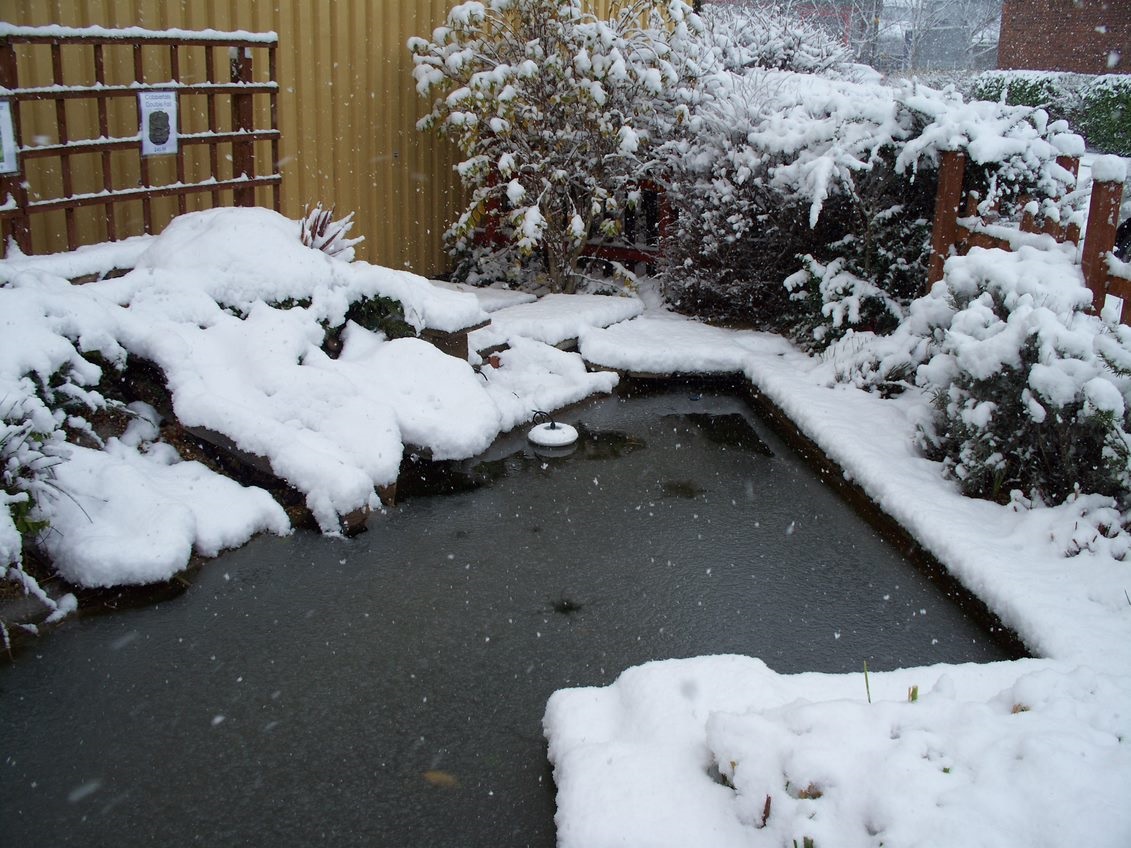21st Nov 2019
So it seems that winter has finally hit this weekend and the big freeze is here! Snow Warnings Issued as Winter Freeze Begins. So with the main winter months of Dec - Jan ahead and preparations for Christmas upon us, it's time to think about making sure your pond and its residents make it through those difficult months and come out the other side happy and healthy ready for spring.
About this time of year as the water cools, ponds effectively enter a state akin to suspended animation as the metabolism and activity of fish and plant life slows to a minimum. That means it's time to take care of a final few jobs to ease your pond through this dormant stage.
Winter Clean-up
There's no better time for a clean up than now. Through the autumn period, even if you've protected your pond with skimmers, nets and covers there has probably been a build up of leaves and other dead plant matter and debris. Left unchecked this debris will sink to the bottom of the pond where it will decay - and combined with fish waste and other material, will over time add significant amounts of nitrates - which will cause all kinds of water problems such as green water and blanketweed.
For this reason many pond experts recommend carrying out a partial water change at this time as well as getting rid of any pond sludge that this material may have already degenerated into. A decent pond vacuum will help you get rid of all that nasty noxious sludge and there are many types of PondVacs widely available to cater for the demands of any pond, large or small.
Keep Your Fish Healthy Through the Freeze
Once water temperatures hit between 7 and 5°C fish will naturally stop eating and drift into a state of partial hibernation. At this time they'll head towards the deeper areas of the pond as this is where there is a layer of warm water. Here they'll stay through the whole of the cold period. However if the water in your pond is still circulating this will mix up the layers of water and lower the temperature in the deeper parts of the pond. For this reason many pond keepers recommend switching off your pond pump completely. If you do this, you can give the pump a good clean and put it back in the deepest part of the pond, switched off, until the spring. Another option favoured by some is simply to decrease the flow rate of your pumps and take care to place them away from the deeper parts of the pond. It's worth remembering that just as the activity of fish will diminish in cold temperatures, so too will the activity of the beneficial bacteria in your biological filter media - therefore turning off your pump is not as drastic a step as it might seem.
If you do decide that this is a good opportunity to strip down your filter, clean it thoroughly and carry out maintenance, be sure to remove all water from any UV clarifiers as any that is left inside could freeze and cause damage.
Freezing Time
If we have a particularly cold winter especially in certain areas of the country your pond may be likely to freeze over. If this freezing lasts for a while (several days or more) that can be a major problem. An iced over pond will prevent the natural exchange of gases at the pond surface (see our earlier post for a fuller explanation). Carbon dioxide and other gases will not be able to escape and sufficient oxygen may be prevented from entering the pond. Such a situation would be likely to make your fish ill or even in the worst cases cause them to die.
People employ various solutions to this age old problem - from floating a small object such as a football in the pond to breakup ice cover - to all manner of pond heating and ice prevention devices (some of which you'll find featured below). The football method is only useful in protecting the rim of a concrete pond from damage caused by the expansion of ice as it freezes. Getting hold of a simple pond heater on the other hand is bound to prove a prudent investment. These days such devices are not only cheap to buy they're also extremely economical to run. The simplest of these devices float on the surface with a heating element beneath, which has the effect of maintaining a small area (usually about the size of a dinner plate) of the surface ice free. It's also possible to purchase thermostatically controlled pond heaters that will turn themselves on and off according to temperature changes.
Prevent Pests and Predators
One final thing to consider is the fact that due to being in their torpid state and there being less plant life providing cover, the fish in your pond at this time of year can be far more vulnerable to predators such as herons and cats etc. For this reason it's worth beefing up any existing netting that you have installed, or you could purchase pond protector devices and technology that are specifically designed for the purpose.
These colder months can be a difficult time for your fish to get through. However with a little bit of preparation they'll over-winter successfully and be ready to thrive and flourish once springtime rolls around again.


